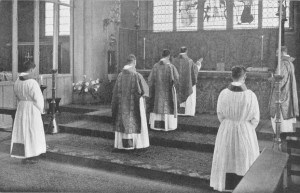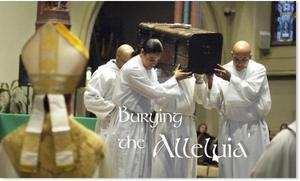The form of the Mass offered according to the Missal of Blessed John XXIII, the 1962 Missasl (known also as the Extraordinary Form [EF]) is a misunderstood theology, manner of worship and experience. It is this form of the Mass that has been heart of the Church’s prayer and sacramentality for generations, that has produced saints, and that has worshiped the Triune God.
The EF was freed from the shackles of ideology by Pope Benedict XVI in his 2007 motu proprio, Summorum Pontificum. You can read the Pope’s Letter to the Bishops about his motu proprio here. Also of interest is Cardinal William Levada’s Instruction on Summorum Pontificum. These three documents are required reading if you want to know what the Magisterium is teaching.
Let it be said that there are many, even among our clergy and supposedly educated types, who have a profound distrust and one could claim, hatred, for the EF that they act uncharitably toward those who may love the EF. In the ecclesiastical provinces of Hartford, Boston and New York have deacons, priests and bishops who actively work against the laity and clergy who have an affection for the John XXIII’s Missal. Knee-jerk reactionaries is not what you would expect from educated people! Experience tells me that it is not an exaggeration to say that there is still a great prejudice toward the adherents of the EF. I also know of seminarians harassed by seminary formation people and pastors for, and some have been dismissed from seminary formation for wanting to know, serve and pray the 1962 Missal, side-by-side the the Ordinary Form of the Mass.
I have found that attending to the Mass in this form to be beautiful, coherent, faithful, and challenging. The 1962 Missal has expanded my categories of faith and life. I generally attend the Ordinary Form; I do attend the EF regularly for several reasons: the Church in which it is offered is a beautiful place to worship; the Liturgy is often well-done (though not always), I want to know more about this Liturgy as a coherent form of worship, theology and as a way of life; I want to know why people feel the need to discredit and be obstructive of those who have dedicated themselves to this portion of the Church’s liturgical tradition.
The title of this post uses the word “still” because I want to emphasize that the EF can facilitate one’s conversion, even re-version, to Jesus Christ and life in His Church. The Mass of the Ages, as some will call the EF, brought humanity for millennia to Christ, and continues to do so.
Read this article, “Old form of Mass attracts new generation,” citing the experience of a former anti-Catholic and another who was an avowed atheist who are now a practicing Catholic due to grace and the liturgical praxis of the EF.
My purpose in writing on this subject is not to defend the the EF. I hope that the above article will expand your view that conversions to Christ, our own and new ones, is possible through one’s praying of the older form of the Mass. That is, we don’t have to be so rigid to exclude others without good reason. Furthermore, it is my hope that we all act with faith, hope and charity toward others who think a little differently from whatever criteria of the “norm” we happen to utilize. In short, may we be truly Catholic according to the mind of the Church and not our own measure of what it means to be Catholic. My desire is to have a reasonable celebration of both rites of the Mass that’s coherent with what the Church has done, with what the tradition as given to us over the years, and with what the Church hopes to be as a Christian people with eyes set on the Lord. I happen to think we need to continue with vigor the work of the Liturgical Movement and do things in the sacred Liturgy that are truly Catholic and not ape what our Protestant brothers and sisters do. Catholic Liturgy is not Lutheran Liturgy, and we ought to resist blurring the lines.
Saint Benedict, and all Benedictine saints, pray for us.

